“Iwanted to hug him one more time; I wanted to visit his grave,” Azhar Abu Surour, mother of Palestinian teen Abdel-Hamid Abu Surour, told me. “Can you imagine that a mother’s biggest dream is to bury her son?”
Azhar Abu Surour’s son Abdel-Hamid was killed by Israeli occupation forces in April 2016 after allegedly carrying out an attack on an Israeli bus. Since then, his body has been withheld by Israeli occupation forces, initially at a morgue in Tel Aviv before being transferred to the “cemeteries of enemy combatants,” known by Palestinians as cemeteries of numbers.
Since 1967, Israel has applied an inconsistent, at times ad hoc, policy of refusing to return the corpses and remains of hundreds of Palestinian and Arab combatants to their families.* The dead were buried in what Israel refers to as “cemeteries for enemy combatants,” mass graves located in areas designated by Israel as closed military zones. Over the years, the Israeli army has used at least five different locations for the purpose of burying “enemy combatants,” denying families any access to information about the place of burial. Palestinians call them “cemeteries of numbers” since the deceased are buried there anonymously with numbers usually etched onto metal placards attached to their corpses or remains. Corpses of the fallen were simply dumped, at times collectively, absent the proper registration of the names of the dead and their place of burial.
The systematically demeaning and negligent manner in which the bodies are buried or dumped, coupled with the lack of proper registration and documentation by Israel’s military rabbinate, makes the process of identifying the victims for potential exhumation an uphill battle for their families.
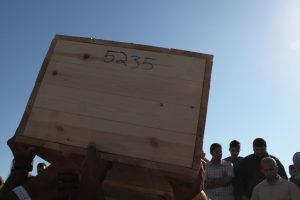
In 2004, Israeli Attorney-General Menachem Mazuz issued a directive in which he stated that the corpses of deceased Palestinian attackers shall not be withheld based on a need to use them as bargaining chips in future negotiations. He did, however, contend that there may be “exceptional justifications” for withholding corpses, including “a concrete prisoner exchange deal with enemy groups.”
In August 2008, the families whose loved ones were thought to have been buried in mass graves or “cemeteries of numbers,” launched a national campaign to retrieve the bodies of the deceased and disclose the fate of those missing. Legally and logistically supported by the Jerusalem Legal Aid Center (JLAC), the national campaign initially sought to demand the release of the bodies and remains languishing in those “cemeteries of numbers,” highlight the struggle of their families, and turn it from a private issue into a national rallying cry.
The national campaign has documented the names of 350 Palestinians whose corpses or remains have been withheld by Israeli occupation authorities, noting that prior to 2015, this practice had rarely been used following the publication of Mazuz’s directive. Dozens of these corpses were released either in prisoner exchange deals or as part of the “goodwill” gestures for the resumption of negotiations between Israel and the Palestinian Authority. On May 31, 2012, for instance, Israel transferred the remains of 91 Palestinians to the Palestinian Authority.
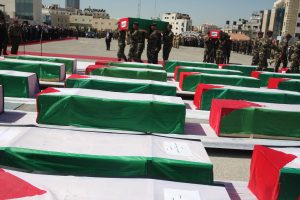
Yet, a clearer, more systematic Israeli policy started to take shape in 2015 with the aim of regulating the practice of withholding corpses. This development meant that the struggle to retrieve the bodies is no longer confined to the borders of historical memory but rather an everyday issue. Following a wave of individual attacks by Palestinians that began in October 2015, the Israeli cabinet announced a package of punitive measures to quell and repress the uprising. They included punitive home demolitions, closures, and the withholding of corpses. Thus, since October 2015, Israeli occupation authorities have withheld the corpses of over 215 Palestinians who were killed or extra-judicially executed after alleged fatal attacks. The policy was further institutionalized toward the end of 2016 as the Israeli government scrambled to formulate a specific policy before any court decision was taken on the issue. On January 1, 2017, the Israeli cabinet’s Ministerial Committee on National Security Affairs formally adopted the “unified policy” on handling the corpses of Palestinian attackers.
This policy stipulated that the government should, in principle, hand over the bodies of Palestinian attackers, after ensuring the preservation of public order at their funerals, unless one of the following two exceptions applies: the attackers are affiliated with Hamas and can thus be used as bargaining chips in potential prisoner exchange deals; or the attacks they carried out are deemed to be exceptionally severe. Should the military deem that one of these two exceptions had been satisfied, it would be authorized to continue to withhold the corpse.
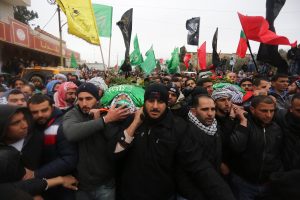
Israeli occupation authorities had by then released the majority of the bodies withheld since 2015 but only after receiving assurances by family members that their funerals would be extremely limited in size and would take place at certain hours during the night or after ordering the families to change the place of burial. These restrictions are supposedly designed to prevent disturbances during the funeral, to keep the funerals as low-profile as possible, and to “protect public security and safety.”
The Israeli military and police have repeatedly argued that the funerals of Palestinian martyrs frequently result in disturbances to public safety and security and lead to incitement. This line of reasoning is used to justify the temporary withholding of the corpses. This was the main argument behind withholding the vast majority of the corpses during the period between 2015 and 2017: Palestinians were accused of turning funerals into riots and of using them to incite against Israel. It was argued, therefore, that they should be punished by withholding the corpse and only releasing it when guarantees are provided that no such riots or incitement would occur.
When the corpses are withheld for alleged security reasons, the Israeli army usually hands them over after weeks or months. According to religious customs and beliefs, the dead should be buried as soon as possible. Thus, for Palestinians, this withholding of the bodies violates their religious rites and is also a form of psychological torture. Parents of victims whose corpses were temporarily withheld describe that their lives were put on hold until the release of their loved ones’ corpses, and that they could not come to terms with the loss of their children until they could finally bury them.
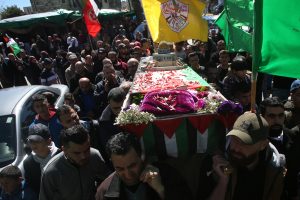
By imposing such severe restrictions on the funerals and by conditioning the release of corpses upon limiting the number of mourners, the Israeli occupation furthermore deprives Palestinians of one of the rare spaces of public solidarity. Funerals of Palestinians who were killed by the Israeli authorities − considered martyrs who gave their lives for the Palestinian cause − provide Palestinians with space where they are able to express collective grief through chanting and marching together. Here, they are able to articulate their rage and to transform individual pain and loss into a source of mobilization and resilience.
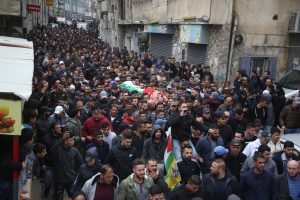
To further cement the practice of delaying the release on security grounds, the Israeli parliament, the Knesset, passed an amendment to the counterterrorism law of 2016, which grants the police the power to temporarily withhold the body of an alleged Palestinian attacker as long as there is reasonable suspicion that handing over the body would violate public safety and security.
Yet, public safety is not the only argument brought up to justify the withholding of corpses. An additional pretext is the use of the corpse of a Palestinian attacker as a bargaining chip in a prisoner swap deal. As noted above, this pretext has not been enacted into law but rather was reiterated by the cabinet’s decision in January 2017. Israel bases its continued withholding of Palestinian corpses as bargaining chips on Regulation 133(3) of the Emergency (Defense) Regulations, promulgated by the British Mandate government in 1945.
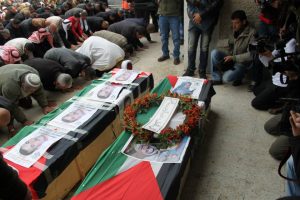
The regulation states that “it shall be lawful for a Military Commander to order that the dead body of any person shall be buried in such place as the Military Commander may direct. The Military Commander may by such order direct to whom and at what hour the said body shall be buried.”
In a petition submitted by JLAC against the legality of the practice, the organization argued that it denies deceased Palestinians their right to dignified and proper burial in accordance with their religious and cultural customs. It also deprives their next of kin of the right to know their fate, to locate and access their gravesites, to determine the cause of their death, and to regain their personal belongings. The practice may amount to enforced disappearance in cases where Israel refuses to acknowledge or disclose the whereabouts of a detained person’s corpse.
The requirement of treating the dead with dignity and humanity is a universally recognized value and a norm of customary international law. Codified in Article 16 of the 1907 Hague Convention, this norm is also protected by Article 15 of the First Geneva Convention, Article 18 of the Second Geneva Convention, and Article 16 of the Fourth Geneva Convention.
“The legal effort has been crucial in securing the release of some of the bodies,” Salwa Hammad, a coordinator for JLAC, told me. “But we cannot count on the Israeli court to deliver justice. Only through local popular mobilization and massive international pressure on Israel will this issue be resolved. Only then will the families be able to bid their loved ones a proper farewell.”
It also amounts to collective punishment, which is prohibited under Article 33 of the Fourth Geneva Convention. Moreover, the practice violates fundamental human rights such as the right to dignity, the right to freedom of religion, the right to family life, the right to property, and the prohibition of cruel, inhuman, and degrading treatment.
In July 2018, the Israeli Supreme Court held a Further Hearing before an expanded panel of seven justices to look into the constitutionality of the policy.
As Palestinians await the court’s issuance of a final decision, the corpses of 42 Palestinians – from among those who have been killed since 2015 – remain withheld as a result of Israeli policies.
*Gilbert, S., Occupied bodies: Israel is withholding the bodies of war victims, September 3, 2013. Retrieved from https://bit.ly/2W8cwiV.


